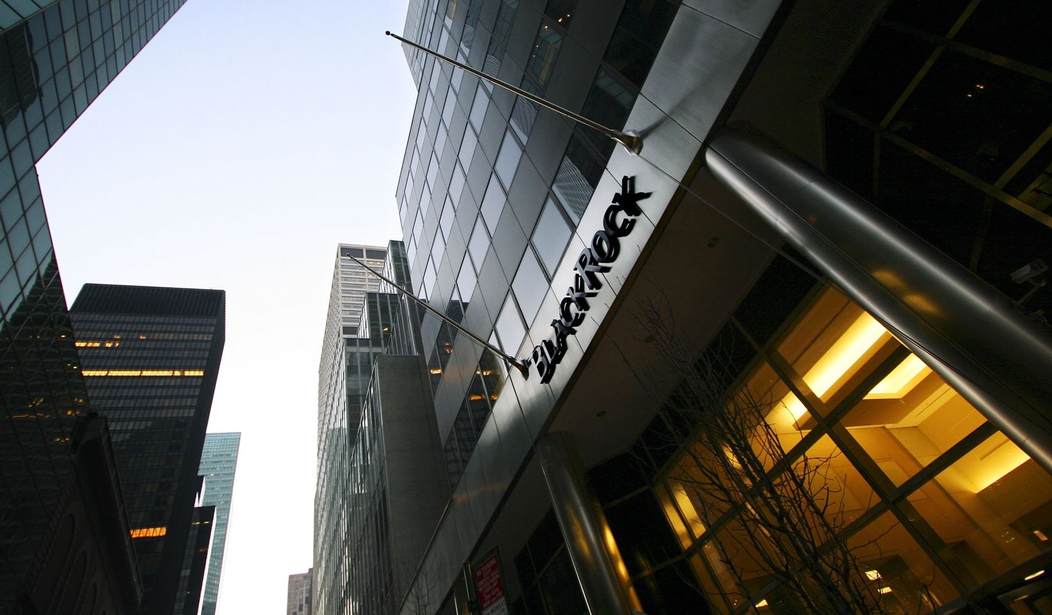After significant efforts to embrace and enforce woke ESG — environmental, social and governance — policies on American companies, behemoth asset manager BlackRock has finally admitted what conservatives have warned: adopting and prioritizing the radical aims of ESG poses a significant risk of adverse effects to its bottom line and legal footing.
The revelation from BlackRock comes courtesy of a filing the company made with the U.S. Securities and Exchange Commission (SEC).
Lamenting that — as a direct result of scrutiny and warnings from conservatives — "BlackRock faces increasing focus from regulators, officials, clients and other stakeholders regarding ESG matters," the company said in the filing that it is "subject to competing demands from different stakeholder groups with divergent views on ESG-related matters, including in countries in which BlackRock operates and invests, as well as in states and localities where BlackRock serves public sector clients."
As Townhall has previously reported, state Republican officials have put BlackRock on notice and taken action to divest billions of dollars from BlackRock due to the company's prioritization of "de-carbonizing" the economy and forcing woke identity quotas for governing boards, among other inane leftist virtue signaling.
BlackRock continues in its filing to complain that some "US states and state officials have adopted or proposed legislation or otherwise have taken official positions restricting or prohibiting state government entities from doing certain business with entities identified by the state as “boycotting” or “discriminating” against particular industries or considering ESG factors in their investment processes and proxy voting," soon "[o]ther states and localities may adopt similar legislation or other ESG-related laws and positions that adversely impact BlackRock’s business." That is, conservatives — led by groups such as Consumers' Research helmed by Will Hild and state attorneys general across the country — are winning.
Recommended
In what seems to be an attempt to blame conservatives and other anti-ESG parties for thinking their investments should be used to earn the highest return and not force the adoption of a leftist agenda in a runaround of Americans' election representatives, BlackRock's filing states that such a "divergence has and continues to increase the risk that any perceived or actual action or lack thereof by BlackRock on such matters on behalf of its clients will be viewed differently by various stakeholders and adversely impact BlackRock’s reputation and business, including through withdrawals, redemptions, terminations or decisions not to commit or invest new capital by clients, as well as legal and governmental action and scrutiny."
As even the Harvard Business Review has noted, "ESG funds certainly perform poorly in financial terms" and to boot, "ESG funds don’t seem to deliver better ESG performance either." So, prioritizing ESG is nothing more than a woke virtue signal that not only fails to perform well for investors, but also doesn't yield the results ESG claims to pursue.
After getting shellacked by conservatives for pursuing ESG (Consumers' Research's Will Hild, again, deserves much of the credit for this) BlackRock told the SEC that it "could be criticized for the scope or nature of any initiatives or goals, or for revisions thereto" and "[s]uch initiatives or goals may be difficult or costly to implement, may not advance at the anticipated pace, or be accomplished within the announced timeframe or at all." The worries about being able to move ahead with ESG initiatives is certainly a direct result of conservative-led pushback from Americans and the investors whose money BlackRock seeks to wield.
Then comes BlackRock's admission that its ESG fool's errand has created significant risk to its financial, regulatory, and legal standing: "If BlackRock is not able to successfully manage ESG-related expectations across varied stakeholder interests, it may adversely affect BlackRock’s reputation, ability to attract and retain clients, employees, shareholders and business partners or result in litigation, legal or governmental action, which may cause its AUM, revenue and earnings to decline."
BREAKING: @BlackRock has admitted that their core business could be "materially adversely affected" by CEO Larry Fink's continued ESG activism, citing it as a key risk factor in their annual filing with the SEC. pic.twitter.com/44VzyBU02W
— Will Hild (@WillHild) March 1, 2024

























Join the conversation as a VIP Member